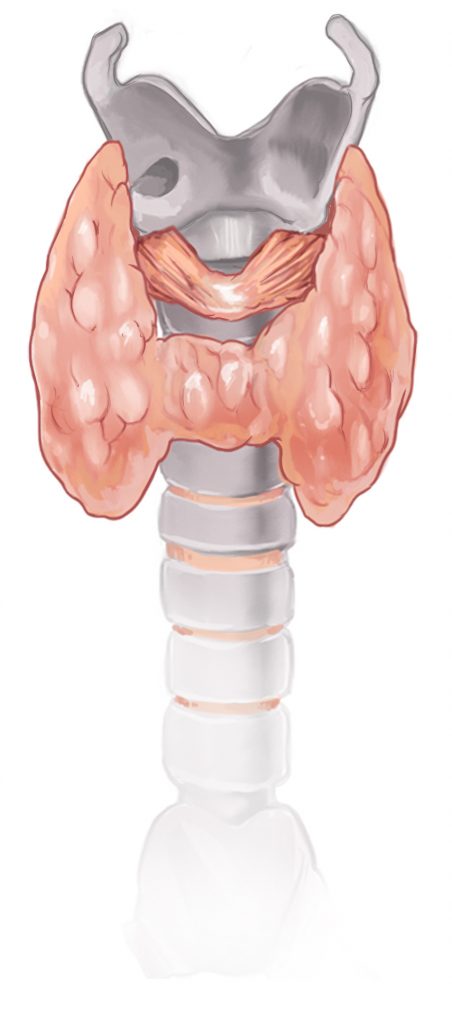The Truth About Ashwagandha Thyroid Benefits
Hypothyroidism is a chronic illness that can affect anyone but is particularly common in women. It's even estimated that as much as 10% of the general population of women may suffer from at least a minor form of this condition. If you're one of the 10 million people in America currently living with a diagnosis, it's time for you to discover an herb known as Ashwagandha. Adding this natural plant to your treatment routine is very easy and has a lot of promise for reducing your symptoms and improving your health.
What is Hypothyroidism?
The thyroid is a small gland, located at the bottom of the neck, that is largely responsible for regulating the body's metabolism through the release of the right hormones. When your thyroid gland becomes underactive or even stops working altogether, you'll naturally experience a lot of metabolism-related problems. Some of the most common symptoms of this condition include:

General fatigue and tiredness no matter how much you rest
-
Muscle weakness that comes and goes in different parts of the body
-
Steady or sudden weight gain that is hard to lose no matter how much you restrict calorie intake
-
Cramping in various major muscle groups, mainly the back, legs, and upper arms
-
Increased sensitivity to cold temperatures, to the point of being physically uncomfortable due to air conditioning or a cool breeze outside
-
Hair loss that can't be traced to stress or hormonal imbalances
-
Chronic constipation
-
Depression and mood swings
-
Anger and overblown reactions to small irritations
-
Dry skin and hair that does not respond well to typical moisturizers
-
Pale skin despite sun exposure or a complexion that is naturally darker
-
Absent or irregular menstrual cycles
-
Loss of sex drive and sexual response to stimulus.
Even the most minor cases of thyroid dysfunction can trigger a cascade of these bothersome symptoms to interrupt your life. While this condition is not directly life-threatening, it can make you feel so depressed that you can't handle your daily responsibilities anymore. Taking control of your thyroid's function is difficult, but it's worth the effort to find the right treatment to restore your natural metabolism. Allowing your metabolism to fail without assistance could leave you struggling with long-term obesity and the serious health risks that come along with it.
What Causes Hypothyroidism?
When your doctor comes back with this diagnosis, it's natural to want to know why your thyroid isn't working like usual. For most patients, especially women, there's no specific or distinct cause. It could be linked to a malfunctioning pituitary gland, which is inside the brain, since this gland has to stimulate the thyroid itself to keep it working normally. It's common to damage the thyroid itself during other medical treatments, such as chemotherapy or goiter removal. Finally, there is some research to suggest that this problem may be partially hereditary as well.
What is Ashwagandha?
 Now that you understand the condition you're facing, it's time to explore how an obscure herb can help you manage it. This herb is native to Asia, especially India. It has been one of the most powerful tools of Ayurvedic medicine for thousands of years. In fact, the name translates directly to "the strength of the stallion" to indicate how much power this humble looking root packs. While this name mainly comes from its ability to help you recover after an illness, it's also tied to the herb's ability to function as an adaptogen herb. You may also find it marketed as Indian ginseng or winter cherry, although these names can refer to other herbs, so it's essential to double check what you're taking.
Now that you understand the condition you're facing, it's time to explore how an obscure herb can help you manage it. This herb is native to Asia, especially India. It has been one of the most powerful tools of Ayurvedic medicine for thousands of years. In fact, the name translates directly to "the strength of the stallion" to indicate how much power this humble looking root packs. While this name mainly comes from its ability to help you recover after an illness, it's also tied to the herb's ability to function as an adaptogen herb. You may also find it marketed as Indian ginseng or winter cherry, although these names can refer to other herbs, so it's essential to double check what you're taking.
The term adaptogen sounds unfamiliar, but it's simply a good way to denote an herb that helps the body adapt to challenges. These plants tend to balance the immune system and metabolism, working to help balance out both over and under active conditions. Adaptogen herb products are particularly powerful in handling hormonal imbalances. Helping your body adapt to the changes created by a struggling thyroid is a reliable way to relieve your symptoms and restore better health without resorting to risky medications with their own list of side effects.
Ashwagandha was once rarely available outside of India, but now it's commonly carried in most health food stores and other supplement sources. While the name refers to an entire plant, it's the root that is primarily used for treatment because it contains the highest concentrations of the active compounds. You might see it in dusty bundles of finger-sized roots, but it's mostly commonly sold in capsules or tea bags for immediate consumption. Preparing the dried roots takes a lot more effort and doesn't necessarily yield a more powerful treatment.
How Does This Herb Help?
There has been recent scientific research into Ashwagandha and there is a major body of anecdotal evidence from the history of Ayurvedic medicine and modern reports from real patients. Adaptogens in general have been scientifically proven to modulate hormone balances in the body, so naturally taking one of these herbs will assist with an underactive thyroid. Surprisingly enough, it will also work if you have an overactive thyroid instead due to a condition like Grave's disease. On top of encouraging your thyroid to produce more or less hormones depending on your needs, taking this herb offers other benefits like:
-
Reduced cortisol levels, which is the hormone related to stress
-
Restored insulin sensitivity, which can reduce the symptoms of diabetes or keep you from developing it in the first place
-
Improved estrogen and progesterone levels, which is essential when you're heading towards menopause
-
Stabilized and improved moods, even if your depression wasn't related to your thyroid issues
This herb is easy to find, affordable, and quite safe. It's important to check in first to rule out interactions with any medications you already take. Seeing your doctor regularly for thyroid function tests will also help you determine how much effect you're getting from a regimen of herbal supplements. In fact, you may even find that herbs are all you need to manage your condition.













































































Leave a comment